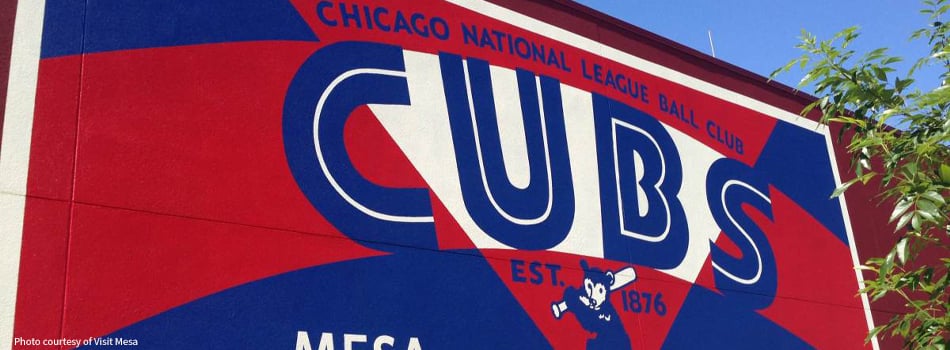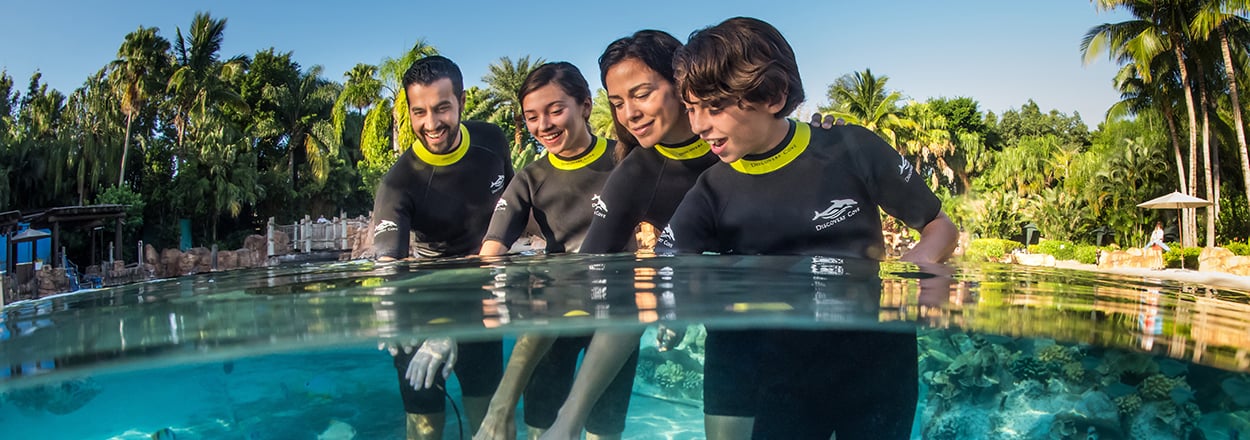Saying your business is “autism friendly” isn’t enough anymore. To truly create an inclusive experience for visitors with autism or other sensory needs, destinations, theme parks and attractions are turning to the experts at the International Board of Credentialing and Continuing Education Standards to train their staff, create soothing spaces and provide resources to help visitors prepare and feel comfortable.
As a travel advisor, when you’re planning travel experiences for clients with special needs, it’s important to go above and beyond your agency’s traditional booking strategies and standards. Remember that engaging in stimulating activities like traveling, interacting with animals and water, and playing outdoors are therapeutic practices for individuals on the autism spectrum, and sometimes take a different kind of research or planning on your part. The following Certified Autism Centers (CAC) know just what it takes to create complete inclusion and acceptance in this fast-growing market of travel for families with special needs.
What is a Certified Autism Center?
The International Board of Credentialing and Continuing Education Standards recognizes a CAC as a facility or organization in which at least 80% of the staff is highly trained, fully equipped and certified in the field of autism. A CAC is dedicated to serving individuals on the spectrum and its staff stays committed to being considered experts by continuing training and education in the field. CACs can range in specific specialty areas such as educational facilities, health care, entertainment, transportation, city government and safety, and of course, hospitality and tourism.
How to get your clients to a CAC
The main factors and challenges travel advisors should consider when booking travel for individuals with special needs are to be as accommodating and adaptable as possible. When it comes to your travel business practices, this means your booking strategies and standards don’t have to be set in stone because every vacation, family and itinerary is unique. Nicole Thibault is the founder of Magical Storybook Travels, a travel agency located in Fairport, New York. As the agency owner and agent herself, Thibault specializes in travel services for families with special needs and family travel, and her business thrives off of an a la carte approach by creating unique and personalized experiences from start to finish.
“Familiarizing clients with their vacation before they even leave is how I help the families I work with overcome anxiety about travel,” says Thibault. “Sometimes they’re nervous about what the bathroom will look like in the hotel. Sometimes they’re looking for a restaurant with chicken nuggets on their menu and that’s what will make or break their decision on destinations to visit.” Thibault says that one of Magical Storybook Travels’ best features is the creation of picture schedules and social stories, which are educational videos (see stssv.com) that help families prepare for their vacation in a visual and audio way that not every travel agency does.
As travel advisors, you’re creating life-changing vacations and memories that last a lifetime for your customers, while making an immense impact on the lives of those on the spectrum across the U.S. Sending families to CACs takes stress away from the parents so everyone in the family can relax, unwind and really enjoy their time together, which is what a vacation is all about.
1. The city of Mesa, Arizona
Mesa, just east of Phoenix, became the first-ever Autism Certified City (ACC) in the world in April 2019. The ACC designation is awarded by IBCCES in places where key community stakeholders like health care, education, local government, hospitality, leisure and corporate members are trained and certified to attract and better serve those with autism and other cognitive disorders. In Mesa and its surrounding area, almost 60 businesses and organizations completed autism certification training, qualifying them as CACs by IBCCES. More than 500 employees of Mesa city parks, recreation and community facilities and more than 1,200 public safety and law enforcement officers are fully committed to autism certification training, which brings the grand total of community involvement to almost 4,000 community members completing or committing to their very own certification. Mesa offers a full-sensory and authentic Arizona experience for every family with plenty of CACs to visit.
Visit Mesa continues rolling out a warm welcome for individuals on the autism spectrum who are visiting the city of Mesa. “Our goal is to ensure individuals with autism and their families enjoy an ideal vacation here,” said Marc Garcia, president & CEO of Visit Mesa, in a 2019 press release from Visit Mesa. “As a parent of a child diagnosed on the spectrum, not only is inclusivity the right thing to do, it makes business sense.”
2. Hohokam Stadium
Hohokam Stadium in Mesa, Arizona, is the spring training facility for the Oakland Athletics, and became a CAC in February 2020, making the team the first MLB organization to earn a CAC designation. Given the stadium’s location in Mesa, it goes along with the city’s dedication to creating an inclusive experience for individuals with autism.
The staff at Hohokam Stadium were trained through the IBCCES program to understand what autism is and how to communicate effectively with individuals with autism. They also learned to be aware of common sensitivities autistic individuals may have in an environment like a baseball stadium. The A’s also made some updates to their home in Oakland, introducing a sensory room to the Oakland Coliseum to create a quiet, soothing space for fans.
3. Aquatica Orlando
Aquatica Orlando became the first CAC-designated water park in the world in January 2019, and has also been voted the nation’s best outdoor water park by USA Today. The park’s website has a sensory guide that walks visitors through the sensory levels of each attraction, rating them from 1 (low sensory stimulation) to 5 (high sensory stimulation) to help visitors prepare for their time at the park. A low sensory area behind Loggerhead Lane, a quiet room near Kata’s Kookaburra Cove, and ride accessibility program are just a few highlights included in the park’s accreditation.
4. Hershey’s Chocolate World
Sweet treats aren’t the only tasteful adventures inside chocolate’s hometown at Hershey’s Chocolate World in Hershey, Pennsylvania. Visitors with autism and other sensory needs can now have the sweetest experience ever because it’s all-things-chocolate for visitors with a sweet tooth. Every year in November, the park holds a Sensory Friendly Night where visitors can enjoy free tour rides with reduced audio, a caregiving companion pass for Create Your Own Candy Bar and 4D show modified into three levels for sensory sensitivities. Visitors can unwrap their senses with chocolate-y delights during the Hershey’s Unwrapped chocolate tasting journey and visit the world’s largest Hershey’s Candy store. It’s also important to know that service animals are permitted in public areas of Hershey’s Chocolate World.
5. Nickelodeon Universe
The number one entertainment brand for kids, Nickelodeon Universe in the center of Mall of America is one of the newest theme parks designated as a CAC. It’s the first CAC-designated destination in Minnesota, with 7 acres of attractions and entertainment for all ages and courage levels. With 27 rides to choose from, ranging from attraction, family, junior or thrill, there’s one for every rider. Plus, sensory guides for each ride prepare riders for the various experiences. Visitors can also meet their favorite Nickelodeon characters, get “slimed,” experience the longest indoor zip line and so much more.
6. Butterfly Wonderland
Butterfly Wonderland is the largest butterfly conservatory in the U.S., located in Scottsdale, Arizona, and became a CAC in January 2020, making it the first butterfly education facility to earn the designation. With 3D movies, Butterfly Emergence Gallery, a 10,000-square-foot butterfly-filled conservatory and endless educational exhibitions about the rainforest and tropical waters, visitors will feel like they’ve been transported to a rainforest far away. The facility’s website has a video tour that takes potential visitors through the facility to help them understand what to expect. The facility’s staff also encourages visitors with special needs to request help during their visit, if they need it.
7. Sesame Place
In October 2018, Sesame Place in Langhorne, Pennsylvania, became the first theme park in the world to be accredited as a CAC. It’s also the only theme park based entirely on Sesame Street, which is bound to create an unforgettable experience, especially for little ones. Similar to Aquatica Orlando, Sesame Place provides guests with a ride accessibility program, quiet rooms, noise-canceling headphones and low sensory areas. Whether it’s eating at Cookie Monster’s Foodie Truck, taking a photo with interactive characters like the Muppets, or visiting the Sesame Street Neighborhood, every visitor will enjoy an authentic experience that fits their needs.
8. Georgia Aquarium
Located in Atlanta, the Georgia Aquarium is the first CAC-designated aquarium, earning the certification in October 2018. It’s also the largest aquarium in the U.S. and the second largest aquarium in the world, and is home to tens of thousands of animals living in its 10 million gallons of water. Visitors can experience the world beneath the waves with excursions like sleeping under the sea or a behind the seas tour. Designated quiet zones, expedited entrances and sensory bags are also available for visitors. This nonprofit is committed to “inspiring awareness and preservation of our ocean and aquatic animals worldwide,” says Anthony Rivera, vice president of guest experience and hospitality.
9. Discovery Cove
In February 2019, Discovery Cove in Orlando became the first all-inclusive day resort and animal interaction park in the U.S. to become a CAC. The tropical resort gives visitors the chance to swim with dolphins, snorkel, hand-feed exotic birds and explore lagoons, rivers and reefs, all within the same day. “Discovery Cove has long been recognized for its adventure-filled yet relaxed environment with a variety of open, clear spaces that make attractions and services more accessible and reduces sensory overload for guests with cognitive disorders,” said Kyle Miller, president of Discovery Cove, in a press release announcing the designation.
10. Santa Barbara Zoo
The first CAC-designated zoo on the West Coast, Santa Barbara Zoo is also one of the world’s most beautiful zoos. It’s located on 30 acres of botanical gardens and accredited by the Association of Zoos and Aquariums, as it’s home to almost 500 animals in open, natural habitats. Every visitor can expect a fun, educational and memorable experience with safari sleepovers, behind-the-scenes tours and programs that contribute to saving wildlife. Quiet spaces along with sensory backpacks that feature fidget cubes, noise-canceling headphones, squeeze balls, zoo cars and more aim to keep the visitors on the autism spectrum feeling safe, supported and welcome at the zoo.
11. SeaWorld Orlando
SeaWorld Orlando fittingly announced its CAC designation on World Autism Awareness Day in April 2019. And like the other parks on this list in the SeaWorld Parks & Entertainment family (Aquatica, Sesame Place and Discovery Cove), SeaWorld Orlando’s website offers a sensory guide to walk visitors through each experience before they visit. Three of SeaWorld’s official hotel partners are CACs as well: Doubletree by Hilton Orlando at SeaWorld, Fairfield Inn & Suites Orlando at SeaWorld and Springhill Suites Orlando at SeaWorld, creating an all-around inclusive vacation experience from start to finish.
This list is only a short collection of the many Certified Autism Centers in the U.S. For a full, searchable list of other CACs in the U.S., visit austimtravel.com.
Editor’s Note: Some of these attractions on this list may be closed due to the pandemic or have special entry requirements in place. Please check with them directly for the latest status.
Originally appeared in the spring 2021 issue of The Compass Magazine





comments